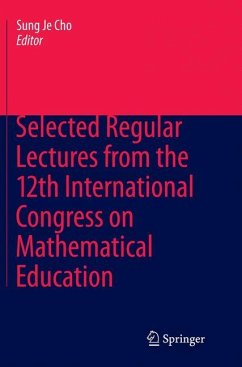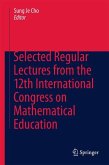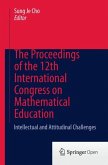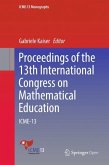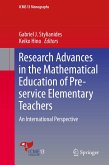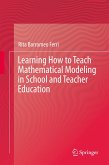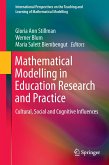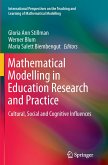Selected Regular Lectures from the 12th International Congress on Mathematical Education
Herausgegeben:Cho, Sung Je
Selected Regular Lectures from the 12th International Congress on Mathematical Education
Herausgegeben:Cho, Sung Je
- Broschiertes Buch
- Merkliste
- Auf die Merkliste
- Bewerten Bewerten
- Teilen
- Produkt teilen
- Produkterinnerung
- Produkterinnerung
This book comprises the full selected Regular Lectures from the Proceedings of the 12th International Congress on Mathematical Education (ICME-12), which was held at COEX in Seoul, Korea, from July 8th to 15th, 2012. ICME-12 brought together 4700 experts from 100 countries, working to understand all of the intellectual and attitudinal challenges in the subject of mathematics education as a multidisciplinary research and practice. These selected Regular Lectures present the work of fifty-one prominent mathematics educators from all over the globe. The Lectures cover a wide spectrum of topics,…mehr
Andere Kunden interessierten sich auch für
![Selected Regular Lectures from the 12th International Congress on Mathematical Education Selected Regular Lectures from the 12th International Congress on Mathematical Education]() Selected Regular Lectures from the 12th International Congress on Mathematical Education76,99 €
Selected Regular Lectures from the 12th International Congress on Mathematical Education76,99 €![The Proceedings of the 12th International Congress on Mathematical Education The Proceedings of the 12th International Congress on Mathematical Education]() The Proceedings of the 12th International Congress on Mathematical Education39,99 €
The Proceedings of the 12th International Congress on Mathematical Education39,99 €![Proceedings of the 13th International Congress on Mathematical Education Proceedings of the 13th International Congress on Mathematical Education]() Proceedings of the 13th International Congress on Mathematical Education39,99 €
Proceedings of the 13th International Congress on Mathematical Education39,99 €![Research Advances in the Mathematical Education of Pre-service Elementary Teachers Research Advances in the Mathematical Education of Pre-service Elementary Teachers]() Research Advances in the Mathematical Education of Pre-service Elementary Teachers75,99 €
Research Advances in the Mathematical Education of Pre-service Elementary Teachers75,99 €![Learning How to Teach Mathematical Modeling in School and Teacher Education Learning How to Teach Mathematical Modeling in School and Teacher Education]() Rita Borromeo FerriLearning How to Teach Mathematical Modeling in School and Teacher Education82,99 €
Rita Borromeo FerriLearning How to Teach Mathematical Modeling in School and Teacher Education82,99 €![Mathematical Modelling in Education Research and Practice Mathematical Modelling in Education Research and Practice]() Mathematical Modelling in Education Research and Practice76,99 €
Mathematical Modelling in Education Research and Practice76,99 €![Mathematical Modelling in Education Research and Practice Mathematical Modelling in Education Research and Practice]() Mathematical Modelling in Education Research and Practice75,99 €
Mathematical Modelling in Education Research and Practice75,99 €-
-
-
This book comprises the full selected Regular Lectures from the Proceedings of the 12th International Congress on Mathematical Education (ICME-12), which was held at COEX in Seoul, Korea, from July 8th to 15th, 2012. ICME-12 brought together 4700 experts from 100 countries, working to understand all of the intellectual and attitudinal challenges in the subject of mathematics education as a multidisciplinary research and practice. These selected Regular Lectures present the work of fifty-one prominent mathematics educators from all over the globe. The Lectures cover a wide spectrum of topics, themes and issues and aim to give direction to future research towards educational improvement in the teaching and learning of mathematics education. This book is of particular interest to researchers, teachers and curriculum developers in mathematics education.
Produktdetails
- Produktdetails
- Verlag: Springer / Springer International Publishing / Springer, Berlin
- Artikelnr. des Verlages: 978-3-319-37342-3
- Softcover reprint of the original 1st ed. 2015
- Seitenzahl: 948
- Erscheinungstermin: 17. Oktober 2016
- Englisch
- Abmessung: 235mm x 155mm x 51mm
- Gewicht: 1405g
- ISBN-13: 9783319373423
- ISBN-10: 3319373420
- Artikelnr.: 46436569
- Herstellerkennzeichnung
- Springer Nature c/o IBS
- Benzstrasse 21
- 48619 Heek
- Tanja.Keller@springer.com
- Verlag: Springer / Springer International Publishing / Springer, Berlin
- Artikelnr. des Verlages: 978-3-319-37342-3
- Softcover reprint of the original 1st ed. 2015
- Seitenzahl: 948
- Erscheinungstermin: 17. Oktober 2016
- Englisch
- Abmessung: 235mm x 155mm x 51mm
- Gewicht: 1405g
- ISBN-13: 9783319373423
- ISBN-10: 3319373420
- Artikelnr.: 46436569
- Herstellerkennzeichnung
- Springer Nature c/o IBS
- Benzstrasse 21
- 48619 Heek
- Tanja.Keller@springer.com
Understanding the nature of the geometric work through its development and its transformations: Kuzniak Alain (France).- Integration of technology into mathematics teaching: Past, present and future:Adnan Baki (Turkey).- Investigating the influence of teachers' pedagogical beliefs and reported practices on student achievement in basic mathematics: Allan B.I. Bernardo (Philippines), Auxencia A. Limjap (Philippines).- Developing free computer-based learning objects for high school mathematics: Examples, issues and directions: Humberto José Bortolossi(Brazil).- Doing research within the anthropological theory of the didactic: The case of school algebra: Marianna Bosch (Spain).- Curriculum reform and mathematics learning: Evidence from two longitudinal studies:Jinfa Cai (USA).- Mathematical problem solving beyond school: Digital tools and students' mathematical representations: Susana Carreira (Portugal).- Teaching probability in secondary school: Paulo Cezar Pinto Carvalho (Brazil).- Mathematics is alive! Project based mathematics: Kyung Yoon Chang (Korea).- Weaving exploration in the process of acquisition and development of mathematical knowledge: Marcos Cherinda (Mozambique).- An illustration of the explanatory and discovery functions of proof: Michael de Villiers (South Africa).- Constructing abstract mathematical knowledge in context: Tommy Dreyfus (Israel).- Digital technology in mathematics education: Why it works (or doesn't): Paul Drijvers (Netherlands).- Mathematical thinking styles in school and across cultures:Rita Borromeo Ferri (Germany).- Learning to see: The viewpoint of the blind:Lourdes Figueiras (Spain), Abraham Arcavi(Israel).- Issues and concerns about integrations of ICT into the teaching and learning of mathematics in Africa : Botswana case:Kgomotso Gertrude Garegae (Botswana).- Learning mathematics in secondary school: Thecase of mathematical modelling enabled by technology: Jonaki B Ghosh (India).- Doing mathematics in teacher preparation: Giving space and time to think, reflect, share and feel: Frédéric Gourdeau (Canada).- Resources, at the core of mathematics teachers' work:Ghislaine Gueudet (France).- Mathematics education reform movement in Indonesia:Sutarto Hadi (Indonesia).- Emotions in problem solving: Markku S. Hannula (Finland).- Freudenthal's work continues:Marja van den Heuvel-Panhuizen(Netherland).- Hands that see, hands that speak: Investigating relationships between sensory activity, forms of communicating and mathematical cognition:Lulu Healy (Brazil).- Teachers learning together: Pedagogical reasoning in mathematics teachers' collaborative conversations:Ilana Seidel Horn (USA).- Transforming education through lesson study: Thailand's decade-long journey:Maitree Inprasitha (Thailand).- Dialectic on the problem solving approach: Illustrating hermeneutics as the ground theory for lesson study in mathematics education:Masami Isoda (Japan).- History, application, and philosophy of mathematics in mathematics education: Accessing and assessing students' overview and judgment:Uffe Thomas Jankvist (Denmark).- Teaching mathematical modelling in school mathematics: Ok-Ki Kang (Korea), Jihwa Noh (Korea).- Implications from Polya and Krutetskii:Wan Kang (Korea).- Derivative or derivation?Matthias Kawski (USA).- The social dimension of argumentation and proof in mathematics classrooms: Christine Knipping (Germany).- Mathematical literacy for living in the highly constructionism: Theory of learning or theory of design?Chronis Kynigos (Greece).- Adjacent schools with infinite distance - Narratives from North Korean mathematics classrooms: Jung Hang Lee (USA/Korea).- Mobile linear algebra with Sage: Sang-Gu Lee (Korea).- Discernment andreasoning in dynamic geometry environments: Allen Leung (Hong Kong).- Riding the third wave: Negotiating teacher and students' value preferences relating to effective mathematics lesson:Chap Sam Lim (Malaysia).- Learning mathematics by creative or imitative reasoning:Johan Lithner (Sweden).- Features of exemplary lessons under the curriculum reform in China: A case study on thirteen elementary mathematics lessons:Yunpeng Ma (China), Dongchen Zhao (China).- Teachers, students and resources in mathematics Laboratory:Michela Maschietto (Italy).- The common core state standards in mathematics:William McCallum (USA).- From practical geometry to the laboratory method: the search for an alternative to Euclid in the history of teaching geometry:Marta Menghini (Italy).- Research on mathematics classroom practice: An international perspective:Ida Ah Chee MOK (Hong Kong).- Information-and-technology-oriented in the 21st Century: Mathematics education from the perspective of human life in society:Eizo Nagasaki (Japan).- Exploring the nature of the transition to geometric proof through design experiments from the holistic perspective:Masakazu Okazaki (Japan).- Laying foundations for statistical inference:Maxine Pfannkuch (New Zealand), Chris J. Wild (New Zealand).- Mathematics education in Cambodia from 1980 to 2012: Challenges and perspectives 2025:Chan Roath(Cambodia).- The challenges of preparing a mathematical lecture for the public:Yvan Saint-Aubin (Canada).- Computer aided assessment of mathematics using stack: Christopher Sangwin (UK).- Numerical analysis as a topic in school mathematics:Shailesh A Shirali (India).- Visualizing mathematics at University? Examples from theory and practice of a linear algebra course:Blanca Souto-Rubio(Spain).- On the golden ratio:Michel Spira (Brazil).- The international assessment of mathematical literacy: PISA 2012framework and items:Kaye Stacey (Australia).- Applications and modelling research in secondary classrooms: What have we learnt?Gloria Stillman (Australia).- Hidden cultural variables to promote mathematics and mathematics education - Are there royal roads?Guenter Toerner (Germany).- Mathematics competition questions: Their pedagogical values and an alternative approach of classification:Tin Lam Toh (Singapore).- What does it mean to understand some mathematics?Zalman Usiskin (USA).- Mapping mathematical leaps of insight:Caroline Yoon (New Zealand).- Conflicting perspectives of power, identity, access and language choice in multilingual teachers' voices:Lyn Webb (South Africa).- Mathematics at university: The anthropological approach:Carl Winsløw (Denmark).- Use of student mathematics questioning to promote active learning and metacognition:Khoon Yoong Wong (Singapore).- The examination system in China: The case of Zhongkao mathematics:Yingkang Wu (China).
Understanding the nature of the geometric work through its development and its transformations: Kuzniak Alain (France).- Integration of technology into mathematics teaching: Past, present and future:Adnan Baki (Turkey).- Investigating the influence of teachers' pedagogical beliefs and reported practices on student achievement in basic mathematics: Allan B.I. Bernardo (Philippines), Auxencia A. Limjap (Philippines).- Developing free computer-based learning objects for high school mathematics: Examples, issues and directions: Humberto José Bortolossi(Brazil).- Doing research within the anthropological theory of the didactic: The case of school algebra: Marianna Bosch (Spain).- Curriculum reform and mathematics learning: Evidence from two longitudinal studies:Jinfa Cai (USA).- Mathematical problem solving beyond school: Digital tools and students' mathematical representations: Susana Carreira (Portugal).- Teaching probability in secondary school: Paulo Cezar Pinto Carvalho (Brazil).- Mathematics is alive! Project based mathematics: Kyung Yoon Chang (Korea).- Weaving exploration in the process of acquisition and development of mathematical knowledge: Marcos Cherinda (Mozambique).- An illustration of the explanatory and discovery functions of proof: Michael de Villiers (South Africa).- Constructing abstract mathematical knowledge in context: Tommy Dreyfus (Israel).- Digital technology in mathematics education: Why it works (or doesn't): Paul Drijvers (Netherlands).- Mathematical thinking styles in school and across cultures:Rita Borromeo Ferri (Germany).- Learning to see: The viewpoint of the blind:Lourdes Figueiras (Spain), Abraham Arcavi(Israel).- Issues and concerns about integrations of ICT into the teaching and learning of mathematics in Africa : Botswana case:Kgomotso Gertrude Garegae (Botswana).- Learning mathematics in secondary school: Thecase of mathematical modelling enabled by technology: Jonaki B Ghosh (India).- Doing mathematics in teacher preparation: Giving space and time to think, reflect, share and feel: Frédéric Gourdeau (Canada).- Resources, at the core of mathematics teachers' work:Ghislaine Gueudet (France).- Mathematics education reform movement in Indonesia:Sutarto Hadi (Indonesia).- Emotions in problem solving: Markku S. Hannula (Finland).- Freudenthal's work continues:Marja van den Heuvel-Panhuizen(Netherland).- Hands that see, hands that speak: Investigating relationships between sensory activity, forms of communicating and mathematical cognition:Lulu Healy (Brazil).- Teachers learning together: Pedagogical reasoning in mathematics teachers' collaborative conversations:Ilana Seidel Horn (USA).- Transforming education through lesson study: Thailand's decade-long journey:Maitree Inprasitha (Thailand).- Dialectic on the problem solving approach: Illustrating hermeneutics as the ground theory for lesson study in mathematics education:Masami Isoda (Japan).- History, application, and philosophy of mathematics in mathematics education: Accessing and assessing students' overview and judgment:Uffe Thomas Jankvist (Denmark).- Teaching mathematical modelling in school mathematics: Ok-Ki Kang (Korea), Jihwa Noh (Korea).- Implications from Polya and Krutetskii:Wan Kang (Korea).- Derivative or derivation?Matthias Kawski (USA).- The social dimension of argumentation and proof in mathematics classrooms: Christine Knipping (Germany).- Mathematical literacy for living in the highly constructionism: Theory of learning or theory of design?Chronis Kynigos (Greece).- Adjacent schools with infinite distance - Narratives from North Korean mathematics classrooms: Jung Hang Lee (USA/Korea).- Mobile linear algebra with Sage: Sang-Gu Lee (Korea).- Discernment andreasoning in dynamic geometry environments: Allen Leung (Hong Kong).- Riding the third wave: Negotiating teacher and students' value preferences relating to effective mathematics lesson:Chap Sam Lim (Malaysia).- Learning mathematics by creative or imitative reasoning:Johan Lithner (Sweden).- Features of exemplary lessons under the curriculum reform in China: A case study on thirteen elementary mathematics lessons:Yunpeng Ma (China), Dongchen Zhao (China).- Teachers, students and resources in mathematics Laboratory:Michela Maschietto (Italy).- The common core state standards in mathematics:William McCallum (USA).- From practical geometry to the laboratory method: the search for an alternative to Euclid in the history of teaching geometry:Marta Menghini (Italy).- Research on mathematics classroom practice: An international perspective:Ida Ah Chee MOK (Hong Kong).- Information-and-technology-oriented in the 21st Century: Mathematics education from the perspective of human life in society:Eizo Nagasaki (Japan).- Exploring the nature of the transition to geometric proof through design experiments from the holistic perspective:Masakazu Okazaki (Japan).- Laying foundations for statistical inference:Maxine Pfannkuch (New Zealand), Chris J. Wild (New Zealand).- Mathematics education in Cambodia from 1980 to 2012: Challenges and perspectives 2025:Chan Roath(Cambodia).- The challenges of preparing a mathematical lecture for the public:Yvan Saint-Aubin (Canada).- Computer aided assessment of mathematics using stack: Christopher Sangwin (UK).- Numerical analysis as a topic in school mathematics:Shailesh A Shirali (India).- Visualizing mathematics at University? Examples from theory and practice of a linear algebra course:Blanca Souto-Rubio(Spain).- On the golden ratio:Michel Spira (Brazil).- The international assessment of mathematical literacy: PISA 2012framework and items:Kaye Stacey (Australia).- Applications and modelling research in secondary classrooms: What have we learnt?Gloria Stillman (Australia).- Hidden cultural variables to promote mathematics and mathematics education - Are there royal roads?Guenter Toerner (Germany).- Mathematics competition questions: Their pedagogical values and an alternative approach of classification:Tin Lam Toh (Singapore).- What does it mean to understand some mathematics?Zalman Usiskin (USA).- Mapping mathematical leaps of insight:Caroline Yoon (New Zealand).- Conflicting perspectives of power, identity, access and language choice in multilingual teachers' voices:Lyn Webb (South Africa).- Mathematics at university: The anthropological approach:Carl Winsløw (Denmark).- Use of student mathematics questioning to promote active learning and metacognition:Khoon Yoong Wong (Singapore).- The examination system in China: The case of Zhongkao mathematics:Yingkang Wu (China).

